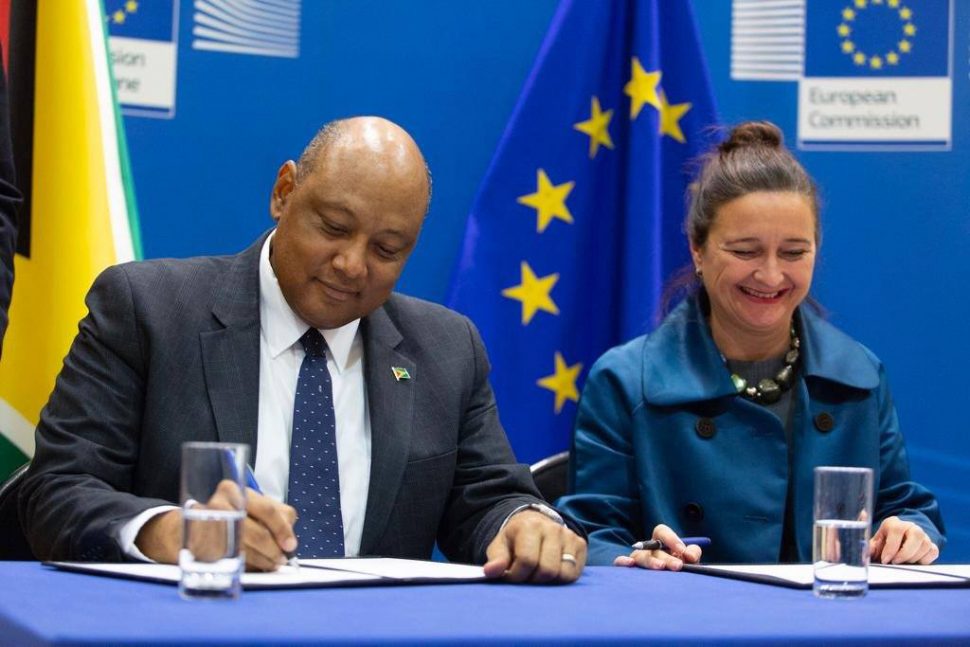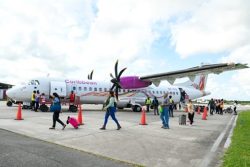Guyana and the European Union (EU) have concluded a six-year process of negotiations to promote trade in legal wood products and ensure the sustainable forest management.
A Voluntary Partnership Agreement (VPA) on Forest Law Enforcement, Governance and Trade (FLEGT) was initialled at a special ceremony at Berlaymont Hall in Brussels, Belgium last Friday, according to the Ministry of Natural Resources, which has described the event as “historic.”
The initialling was done by Natural Resources Minister Raphael Trotman on behalf of the Co-operative Republic of Guyana, and Deputy Director General for the Directorate-General for International Cooperation and Development (DG DEVCO) Marjeta Jager on behalf of the EU.
According to a media release disseminated by the Delegation of the EU to Guyana, this new agreement will give EU-based timber buyers assurance that timber products from Guyana are legal and will also help to improve forest governance, tackle illegal logging and promote trade in verified legal timber products.
Through the VPA, the EU Delegation release said Guyana will “tackle trade in timber that has been illegally harvested, transported or processed,” and in this way market access for law-abiding businesses will be improved and there will be the modernisation of the forestry sector, creation of jobs, promotion of sustainable development and the protection the rights of indigenous peoples.
European Commissioner for Inter-national Cooperation and Development Neven Mimica was quoted as saying, “This is an important step towards promoting the sustainable development of timber trade, protecting our planet and at the same time creating jobs and contributing to the competitiveness of the forestry sector. The EU is committed to supporting Guyana’s efforts to implement the Voluntary Partnership Agreement in the years ahead.”
Trotman, according to the EU release, said, “The forestry sector in Guyana is an important contributor to the national economy, generating jobs and helping to reduce poverty. The Voluntary Partnership Agreement with the EU will help Guyana to develop the sector by improving forest management and governance. By rooting out illegality, it will boost trade and contribute to Guyana’s goals on climate change, biodiversity conservation and sustainable development.”
The agreement, it was explained, will enter into force as soon as the EU and Guyana have completed their internal procedures for signing and ratifying it. To implement the agreement, Guyana will develop systems and procedures to verify that all timber and timber products comply with relevant laws and regulations. “Among other things, this means ensuring that loggers don’t fell more trees than they are allowed to harvest, factories uphold health and safety regulations, and companies pay sufficient taxes,” the release added.
This process, the release noted, will involve identifying and addressing possible gaps in the forest allocation process and in the legal framework, upgrading systems for tracking wood through the supply chain, improving procedures for verifying legal compliance, and supporting Guyana in developing approaches for ensuring that the traditional rights of Amerindian peoples are not impeded.
Additionally, this process will also include the establishment of independent audits, a complaints mechanism, and systems and procedures for making information on the forest sector publicly available. This process will be accompanied by a joint oversight of progress by the EU and Guyana.
Once the VPA is fully implemented, Guyana’s shipments of timber products to the EU will have to be accompanied by a FLEGT licence, demonstrating their legality, the release said, before adding that “such a licence would certify that the products meet the requirements of the EU Timber Regulation, which prohibits the placing of illegal timber on the EU market.”
Implementation phase
The Natural Resources press release explained that the agreement sets an example for the Caribbean region as it is the first VPA in a Caribbean country and paves the way for future agreements to be signed with neighboring countries.
It adds that Guyana will now head to implementation stage, joining six countries, Cameroon, Central African Republic, Ghana, Indonesia, Liberia, and Republic of the Congo, which already have FGEGT agreements with the EU.
In this implementation phase, the release said, all gaps identified during the field-testing exercise in July, 2017 will be addressed to strengthen the entire system see the eventual issuance of FLEGT Licenses.
“For the implementation phase, the establishment of support structures to develop the road-map plan for the implementation phase is the first item on the agenda upon return to Guyana. There will first be the formation of the National Implementation Working Group (NIWG), which will be done through a very transparent and open process where all stake holders would be invited to choose the members of the NIWG,” the release said, while adding that all government agencies and ministries will be involved in the plan to establish a Governance Coordination Body. There will also be the creation of the Joint Monitoring and Review Committee with representation from both Guyana and the EU.
The road map plan, the release said, will contain activities by indicative timelines as well as cost estimates for the various activities of the implementation plan. Work plan activities for the Implementation Phase will be coordinated by the NIWG. The Implementation Phase can take between 3-5 years with an estimated cost of US $30 million, the release said.






